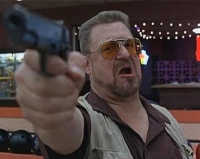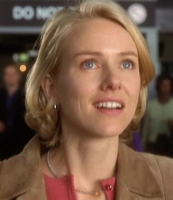Kevin J. Olson at Hugo Stiglitz Makes Movies has tagged me with the Favorite Films Characters Meme, which appears to have originated over at FilmSquish. I don't have a film to review at the moment, so what the heck? Bear in mind that my film literacy skews recent, and my own life experience skews... er, white and male. Therefore my list perhaps inevitably reflects those biases. Here we go, in chronological order: 1. Norman Bates (Anthony Perkins), Psycho (1960)
People always mean well. They cluck their thick tongues, and shake their heads and suggest, oh, so very delicately.
Hitchcock may be the hand behind Psycho’s whipsaw narrative shift and its preternaturally sneaky diversion of audience sympathies, but it’s Anthony Perkins’ timeless and astoundingly skillful portrayal that lends the film its humanity (paradoxically enough). Never mind the crude Freudian outlines to Norman Bates. Psycho is scarcely big enough to contain the chilling, contradictory gestalt that Perkins creates: placid, defensive, genial, resentful, anxious, seething, all capped with a dose of awkward schoolboy eroticism. The effect is simultaneously disquieting and pitiable. Norman is a monster who is acutely cognizant of his own guilt, but completely unable and unwilling to cease his atrocities. Traumatized and wracked to his core, the viewer almost feels sorry for him. Then again, there’s that ghost of an impish smile as Abergast’s car sinks into the pond: “I’ve been a bad boy, haven’t I?â€
2. Leo Bloom (Gene Wilder), The Producers (1968)
I'm sorry I called you "Fat, fat, fat".
With his breakout role as terminally nebbishy accountant Leo Bloom, Gene Wilder created what may be the most overwrought, pathetic little milquetoast in the history of film comedy. Between Zero Mostel’s venal, scenery-gorging ogre, Max Bialystock, and the countless zany secondary and tertiary characters that populate The Producers, one might expect poor Leo Bloom to vanish. Not so. Wilder’s peculiar bookkeeper—all anxiousness, sweat, and frizz—claims the spotlight as the story’s pitiable victim, but also as an object of derision, given his ludicrous emotional fragility and utter spinelessness. Bloom is a bullied, feeble man-child with no morals and the coping skills of a toddler, and yet Wilder manages to make his loser antics tremendously funny for every moment he’s on screen.
3. Father Damien Karras (Jason Miller), The Exorcist (1973)
Come into me. God damn you. Take me.
Two stellar characters lend The Exorcist its exquisite drama: Ellen Burstyn’s brittle-yet-resolute Chris MacNeil and Jason Miller’s Damien Karras. Burstyn’s performance may be slightly superior, but it’s Karras who is the keystone to the story’s potency. Even a Baptist-turned-atheist such as myself can sense the distinctly Catholic character to Miller’s portrayal: wit and soothing reason on the surface, ache and tribulation beneath. A counselor priest whose own faith is splintering, Karras flagellates himself (via boxing and running) to make amends for his sins of negligence, and to hold back his suffocating despair in the face of the world’s sorrows and madness. The shrewd, gentle establishment of Karras’ suppressed fear and anger for the ninety minutes that precede the titular exorcism transform the climactic confrontation with Pazuzu from a B-movie showdown into a scene of terrifying emotional force.
4. Chief Phillips (Albert Hall), Apocalypse Now (1979)
My orders say I'm not supposed to know where I'm taking this boat, so I don't. But one look at you, and I know it's gonna be hot.
Colonel Kurtz is the obvious pick, although Captain Willard, Lieutenant Kilgore, and Hopper’s photojournalist are all worthies. Still, the figure that leaps to mind as Apocalypse Now’s most fascinating character—as opposed to performance—is Albert’s Hall’s long-suffering Chief Phillips. The marvelously tough Phillips is the film’s most substantial personality, brimming with anxieties, antipathies, and tenderness. In a film that often feels like a nightmare, he seems to be the only human soul on that boat. Phillips wears two masks throughout Willard’s spiritual journey “way up†the river: the voice of sanity and the hindering dissenter. Coppala’s thematically labyrinthine film deftly accommodates these dual roles, and Hall conveys them both with an emotional ferocity that gives one chills. Just look into those enormous eyes as he contemplates Mr. Clean’s slain body: Is there any doubt that he’s made the decision right there to kill Willard?
5. Seth Brundle (Jeff Goldblum), The Fly (1986)
I'm an insect who dreamt he was a man and loved it. But now the dream is over... and the insect is awake.
If one were to submit that David Cronenberg’s The Fly is a modern horror masterpiece (and I do), the single most vital component to its success would undoubtedly be Seth Brundle himself, one of the most precisely drawn horror protagonists of all time. Allegorical readings of The Fly abound, but Seth succeeds as a character because he fits so neatly within the story’s science-fiction parameters, without requiring grand gestures to elements that dwell outside the story. He is utterly believable, utterly understandable, and utterly tragic. In a pinnacle performance, Jeff Goldblum inexorably ushers us into a terrifying (and sublimely simple) tale of degeneration: of body, gene, species, mind, love, and morality. Goldblum’s signature tics do more than convey Seth’s bookish eccentricities. They are a cunning means to illustrate—via a stop-motion tapestry of evolution and retention—the slow triumph of the invertebrate within.
6. Clarice Starling (Jodie Foster), The Silence of the Lambs (1991)
They don't have a name for what he is.
Anthony Hopkins’ defining portrayal of Hannibal Lector gets the lion’s share of the attention, but let’s be honest, here: the dramatic might of The Silence of the Lambs flows directly from the presence of Clarice Starling. Lector is less a character than a force, part Dragon, part Wise Man on the Mountain. It’s Starling who is the traveler groping her way through Lambs’ Stygian explorations of ambition, knowledge, guilt, class, and, most devastatingly, gender. In one of the most awe-inspiring performances of the late twentieth-century, Foster crafts a heroine for the ages, a detective-warrior who risks the most terrible violations—physical and psychological—for reasons both noble and pathetic. Foster achieves a sublime alchemy with Starling, rendering her flawed humanity and superhuman courage with equivalent forcefulness. The result takes your breath away.
7. Walter Sobchak (John Goodman), The Big Lebowski (1998)
Smokey, my friend, you are entering a world of pain.
We all know someone like Walter Sobchak: an arrogant gasbag with a volcanic temper and a compulsive need to be right. He is, in short, a colossal asshole, so how is it that The Big Lebowski’s miserable mountain of a Vietnam vet comes across as such a delicious character? The magic trick lies somewhere at the confluence of the Coen brothers’ dense, deliriously funny script and in the genius of John Goodman, who paints streaks of honor and sadness onto a fundamentally repellant, unstable person. It’s not just the relentlessly quoted pearls of Sobchak “wisdom†that stick with you, but also that familiarity, the sense that this guy could be rolling at the bowling alley down the street. Perhaps more than any Coen character, Walter exists as both a caricature and as exile from the real world, as lost and full of resentments as the Dude is content.
8. Max Fischer (Jason Schwartzman), Rushmore (1998)
I saved Latin. What did you ever do?
Rushmore endures as Wes Anderson’s finest film to date, and central to its virtues is the exasperating, endearing Max Fischer, a fearless geek of outsized ambitions and abundant faux-maturity. It’s preposterous to envision anyone other than Jason Schwartzman filling Max’s shoes. He flawlessly captures Max’s odd-duck blend of intellect, energy, self-importance, and starry-eyed naïveté. Still, Max’s confounding vacillation between contentment and restlessness marks him as a depressingly normal adolescent, albeit one whose epic approach to everything makes a durable impression on those around him. Rushmore features an astonishing number of delicately realized relationships, and yet Max remains its Pole Star, a kid whose boundless zeal to do things infuses Anderson’s film with an infectious earnestness.
9. Diane Selwyn / Betty Elms (Naomi Watts), Mulholland Drive (2001)
It'll be just like in the movies. Pretending to be somebody else.
Diane Selwyn is the most vivid and empathetic incarnation of David Lynch’s Woman in Trouble, an archetype that runs through his filmic nightmares from Blue Velvet to INLAND EMPIRE. Naomi Watts, in the performance of her career, portrays the gray husk of Mulholland Drive's Diane Selwyn with such hideous contempt that she provokes revulsion and pity in equal measure. Then again, she did have her lover murdered, a nasty detail that Diane blots out by plunging deep into her fever-dream persona, Better Elms, a ridiculously chipper projection of her desires (and the viewer’s). Watts’ mesmerizing presence—wide-eyed, weary, or sobbing through clenched teeth—achieves something fresh within the Lynchian cosmos: a protagonist who realizes with keenly felt horror that the demon is within her. She is the monster behind the Winkie’s, the geriatric homunculi, the Italian gangsters, the Cowboy. She is “the one who’s doing it.â€
10. William Cutting (Daniel Day Lewis), Gangs of New York (2002)
Here's the thing... I don't give a ten-penny fuck about your moral conundrum, you meat-headed shit-sack... That's pretty much the thing.
I’m a feisty defender of Martin Scorsese’s vivid urban opera, Gangs of New York, but even I must concede that it would be only half as evocative without the presence of one Bill “The Butcher†Cutting. As embodied by Daniel Day Lewis, Bill is a ruthless nativist with the disposition of a mad wildcat. What sets him apart from American cinema’s countless other xenophobes is not just his foaming grandiosity or his gleeful affinity for bloodletting, but his disquieting sense of self. Here is a beast who recognizes his own conflicting weaknesses—cruelty, showmanship, hypocrisy, sentimentality—and yet also sees his place in America’s fabric with clarity. His refusal to stifle the intrinsic violence of the American character for the sake of social order marks him as a kind of revisionist history Antichrist, a villain that represents all that we have repressed about where we came from, what we are, and where we are going.














